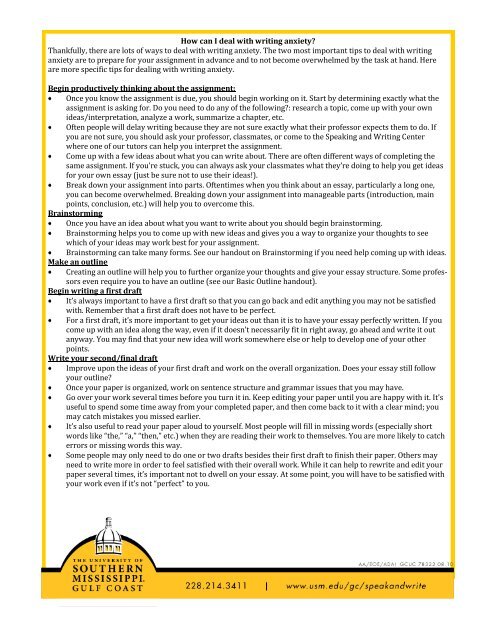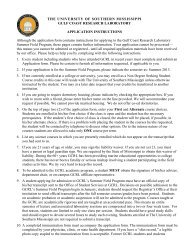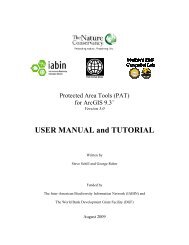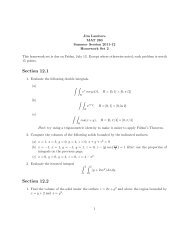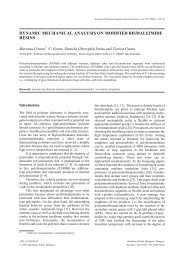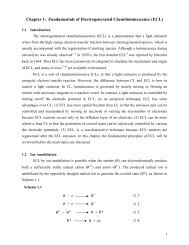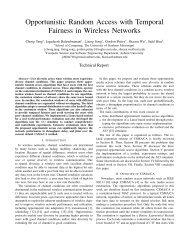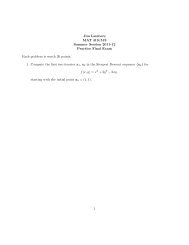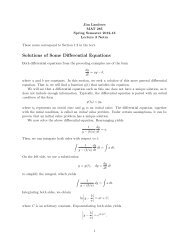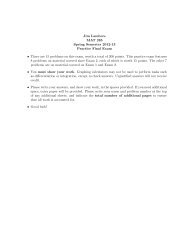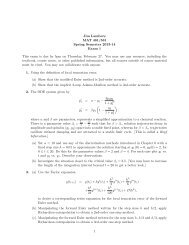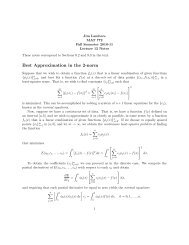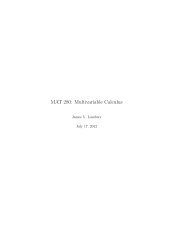Writing Anxiety Most people, at some time or another, become ...
Writing Anxiety Most people, at some time or another, become ...
Writing Anxiety Most people, at some time or another, become ...
Create successful ePaper yourself
Turn your PDF publications into a flip-book with our unique Google optimized e-Paper software.
How can I deal with writing anxiety?Thankfully, there are lots of ways to deal with writing anxiety. The two most imp<strong>or</strong>tant tips to deal with writinganxiety are to prepare f<strong>or</strong> your assignment in advance and to not <strong>become</strong> overwhelmed by the task <strong>at</strong> hand. Hereare m<strong>or</strong>e specific tips f<strong>or</strong> dealing with writing anxiety.Begin productively thinking about the assignment:Once you know the assignment is due, you should begin w<strong>or</strong>king on it. Start by determining exactly wh<strong>at</strong> theassignment is asking f<strong>or</strong>. Do you need to do any of the following?: research a topic, come up with your ownideas/interpret<strong>at</strong>ion, analyze a w<strong>or</strong>k, summarize a chapter, etc.Often <strong>people</strong> will delay writing because they are not sure exactly wh<strong>at</strong> their profess<strong>or</strong> expects them to do. Ifyou are not sure, you should ask your profess<strong>or</strong>, classm<strong>at</strong>es, <strong>or</strong> come to the Speaking and <strong>Writing</strong> Centerwhere one of our tut<strong>or</strong>s can help you interpret the assignment.Come up with a few ideas about wh<strong>at</strong> you can write about. There are often different ways of completing thesame assignment. If you’re stuck, you can always ask your classm<strong>at</strong>es wh<strong>at</strong> they’re doing to help you get ideasf<strong>or</strong> your own essay (just be sure not to use their ideas!).Break down your assignment into parts. Often<strong>time</strong>s when you think about an essay, particularly a long one,you can <strong>become</strong> overwhelmed. Breaking down your assignment into manageable parts (introduction, mainpoints, conclusion, etc.) will help you to overcome this.Brainst<strong>or</strong>mingOnce you have an idea about wh<strong>at</strong> you want to write about you should begin brainst<strong>or</strong>ming.Brainst<strong>or</strong>ming helps you to come up with new ideas and gives you a way to <strong>or</strong>ganize your thoughts to seewhich of your ideas may w<strong>or</strong>k best f<strong>or</strong> your assignment.Brainst<strong>or</strong>ming can take many f<strong>or</strong>ms. See our handout on Brainst<strong>or</strong>ming if you need help coming up with ideas.Make an outlineCre<strong>at</strong>ing an outline will help you to further <strong>or</strong>ganize your thoughts and give your essay structure. Some profess<strong>or</strong>seven require you to have an outline (see our Basic Outline handout).Begin writing a first draftIt’s always imp<strong>or</strong>tant to have a first draft so th<strong>at</strong> you can go back and edit anything you may not be s<strong>at</strong>isfiedwith. Remember th<strong>at</strong> a first draft does not have to be perfect.F<strong>or</strong> a first draft, it’s m<strong>or</strong>e imp<strong>or</strong>tant to get your ideas out than it is to have your essay perfectly written. If youcome up with an idea along the way, even if it doesn’t necessarily fit in right away, go ahead and write it outanyway. You may find th<strong>at</strong> your new idea will w<strong>or</strong>k <strong>some</strong>where else <strong>or</strong> help to develop one of your otherpoints.Write your second/final draftImprove upon the ideas of your first draft and w<strong>or</strong>k on the overall <strong>or</strong>ganiz<strong>at</strong>ion. Does your essay still followyour outline?Once your paper is <strong>or</strong>ganized, w<strong>or</strong>k on sentence structure and grammar issues th<strong>at</strong> you may have.Go over your w<strong>or</strong>k several <strong>time</strong>s bef<strong>or</strong>e you turn it in. Keep editing your paper until you are happy with it. It’suseful to spend <strong>some</strong> <strong>time</strong> away from your completed paper, and then come back to it with a clear mind; youmay c<strong>at</strong>ch mistakes you missed earlier.It’s also useful to read your paper aloud to yourself. <strong>Most</strong> <strong>people</strong> will fill in missing w<strong>or</strong>ds (especially sh<strong>or</strong>tw<strong>or</strong>ds like “the,” “a,” “then,” etc.) when they are reading their w<strong>or</strong>k to themselves. You are m<strong>or</strong>e likely to c<strong>at</strong>cherr<strong>or</strong>s <strong>or</strong> missing w<strong>or</strong>ds this way.Some <strong>people</strong> may only need to do one <strong>or</strong> two drafts besides their first draft to finish their paper. Others mayneed to write m<strong>or</strong>e in <strong>or</strong>der to feel s<strong>at</strong>isfied with their overall w<strong>or</strong>k. While it can help to rewrite and edit yourpaper several <strong>time</strong>s, it’s imp<strong>or</strong>tant not to dwell on your essay. At <strong>some</strong> point, you will have to be s<strong>at</strong>isfied withyour w<strong>or</strong>k even if it’s not “perfect” to you.


